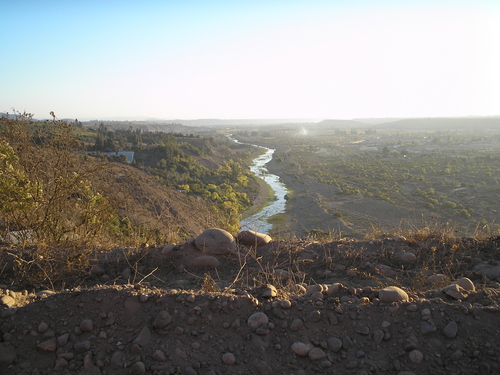From TKWB - Traditional Knowledge World Bank
Jump to navigation
Jump to search
| SUCCESS STORY |
 |
| Technique: |
KNOWLEDGE PASSED ON DOWN THE GENERATIONS |
| Project: |
Land degradation and possible solutions through education |
| Site: |
The region of Ovalle-Recoleta, CHILE |
|
Location

Click the globe to see the technique on Google Map
|
Continent: South America
Country: Chile
Site: Region of Ovalle-Recoleta
Coordinates:
Lat.:
-30.59
Long.:
-71.20 |
Brief introduction
The main activities of Recoleta are the breeding of goats, the mining industry and viticulture.
Problems, causes and effects
Natural resources are severely threatened by an incipient desertification process. In fact, the region of Recoleta is heavily exploited. After the Spanish conquest and occupation, the population which swiftly settled the region, has always practiced subsistence activities. The depletion of meadows due to mining works and charcoal production, dry or pluvial agriculture, and the overgrazing of pastures have completely exhausted the soil. Generally speaking, the over-exploitation of land, abuses in the extraction of mineral resources associated with inappropriate methods and techniques of production – such as the cultivation of cereals on unsuitable ground -, are the causes of desertification in Chile. To this we must add a scarcity of rainfall and long periods of drought, which exacerbate the phenomenon. As a consequence, the population has no fodder for its animals and soils are eroded.
Solutions/Project description
Faced with such an alarming environmental degradation, the Association Juventude par el Desarrollo y la Produccion (JUNDEP), ONG active in Chile, has decided to react by educating children: the most sensitive part of the population and those who will determine the future. The member of JUNDEP are convinced that the social, cultural, economic and environmental change must go through a change in behaviour and in individual’s priorities. This is the reason why ONG has chosen primary school as the objective for its project for fighting desertification. his project for environmental education therefore consists of some activities such as the creation of a nursery and an arboretum, the construction of a well and the sale of the grown products. The preference was for local species and exotic species relevant to the agricultural economy of the region: the cypress, acacia, eucalyptus, willow, poplar, palm and carob. Among the fruit trees are instead: apricot, vine, fig and olive.
Conclusions
It is essential that children should be given an ecological education and that they become aware of the importance of protecting their natural environment, understanding what they can practically do.
Images
 
Deepening
|
TRADITIONAL TECHNIQUE DATA
| Author: |
|
| Other authors: |
|
| Reference: |
www.itaipu.gov.br |
|
|